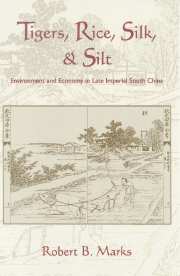Book contents
- Frontmatter
- Contents
- List of Maps, Figures, and Tables
- Dynasties, Qing Dynasty Emperors' Reign Dates, and Weights and Measures
- Acknowledgments
- Tigers, Rice, Silk, and Silt
- Introduction
- 1 “Firs and Pines a Hundred Spans Round”: The Natural Environment of Lingnan
- 2 “All Deeply Forested and Wild Places Are Not Malarious”: Human Settlement and Ecological Change in Lingnan, 2–1400 CE
- 3 “Agiriculture Is the Foundation”: Economic Recovery and Development of Lingnan During the Ming Dynasty, 1368–1644
- 4 “All the People Have Fled”: War and the Enviroment in the Mid-Seventeenth Century Crisis, 1644–83
- 5 “Rich Households Compete to Build Ships”: Overseas Trade and Economic Recovery
- 6 “It Never Used to Snow”: Climatic Change and Agricultural Productivity
- 7 “There Is Only a Certain Amount of Grain Produced”: Granaries and the Role of the State in the Food Supply System
- 8 “Trade in Rice Is Brisk”: Market Integration and the Environment
- 9 “Population Increases Daily but the Land Does Not”: Land Clearance in the Eighteenth Century
- 10 “People Said that Extinction Was Not Possible”: The Ecological Consequences of Land Clearance
- Conclusion
- Bibliography
- Index
7 - “There Is Only a Certain Amount of Grain Produced”: Granaries and the Role of the State in the Food Supply System
Published online by Cambridge University Press: 17 August 2009
- Frontmatter
- Contents
- List of Maps, Figures, and Tables
- Dynasties, Qing Dynasty Emperors' Reign Dates, and Weights and Measures
- Acknowledgments
- Tigers, Rice, Silk, and Silt
- Introduction
- 1 “Firs and Pines a Hundred Spans Round”: The Natural Environment of Lingnan
- 2 “All Deeply Forested and Wild Places Are Not Malarious”: Human Settlement and Ecological Change in Lingnan, 2–1400 CE
- 3 “Agiriculture Is the Foundation”: Economic Recovery and Development of Lingnan During the Ming Dynasty, 1368–1644
- 4 “All the People Have Fled”: War and the Enviroment in the Mid-Seventeenth Century Crisis, 1644–83
- 5 “Rich Households Compete to Build Ships”: Overseas Trade and Economic Recovery
- 6 “It Never Used to Snow”: Climatic Change and Agricultural Productivity
- 7 “There Is Only a Certain Amount of Grain Produced”: Granaries and the Role of the State in the Food Supply System
- 8 “Trade in Rice Is Brisk”: Market Integration and the Environment
- 9 “Population Increases Daily but the Land Does Not”: Land Clearance in the Eighteenth Century
- 10 “People Said that Extinction Was Not Possible”: The Ecological Consequences of Land Clearance
- Conclusion
- Bibliography
- Index
Summary
Peoples and societies nearly everywhere in the world stored grain against the vagaries of weather, markets, invasion, and war, to mention the most obvious causes of food shortages, dearth, famine, and subsistence crises. In China, with its long imperial history, state-managed and state-sponsored granaries supplemented private arrangements by peasant-producers, landowners, and rice shop merchants to store grain from one year to the next. In the Qing dynasty (1644–1911), the success of this combination of state and private efforts, given adequate surpluses from harvests, or at least some bumper years every now and again, meant adequate food supplies even after bad harvests, food prices within ranges tolerable for most or all social classes, and social order, while failure or periodic breakdown of this effort spelled disaster.
State intervention into the management of the food supply system thus was to be one way — albeit an important one — that Chinese society responded to the variation in harvests caused by pestilence or climatic changes. But doing so through the state-managed granary system required such commitment, expertise, and energy on the part of state bureaucrats that they came to look for more efficient ways to ensure the subsistence of the human population of south China by moving rice from grain-surplus to grain-deificit regions via the market rather than by storing it in each and every county.
- Type
- Chapter
- Information
- Tigers, Rice, Silk, and SiltEnvironment and Economy in Late Imperial South China, pp. 226 - 248Publisher: Cambridge University PressPrint publication year: 1998



